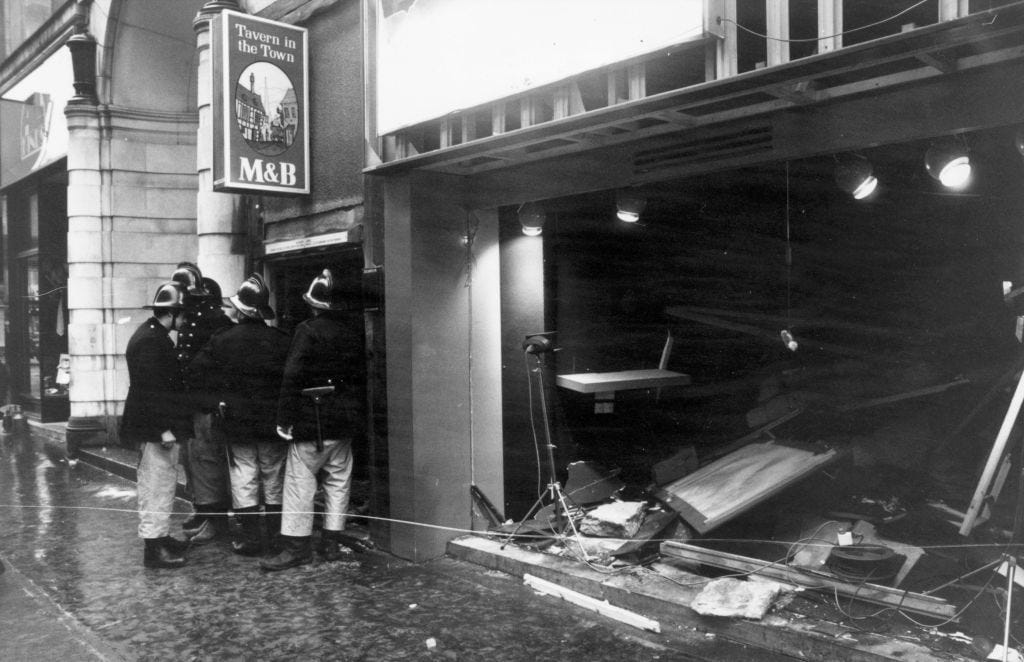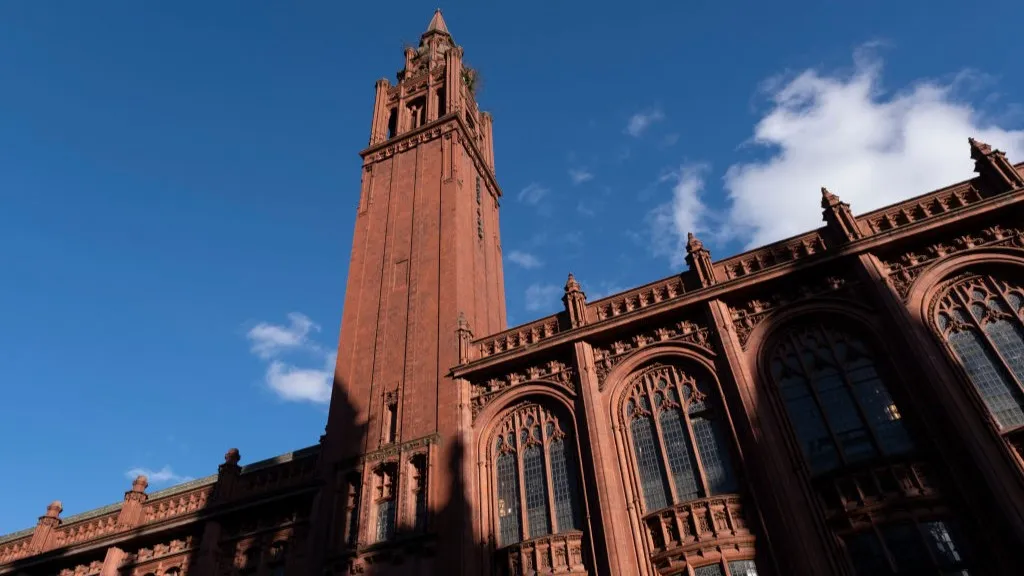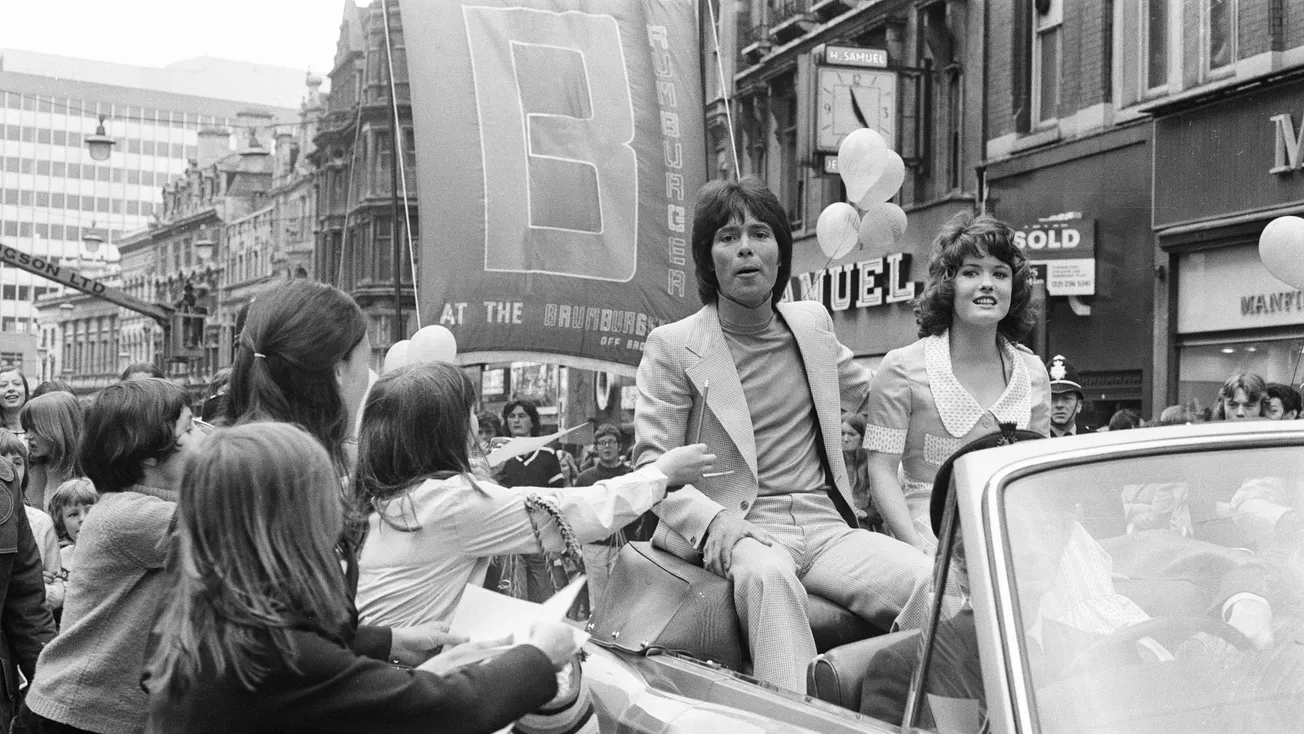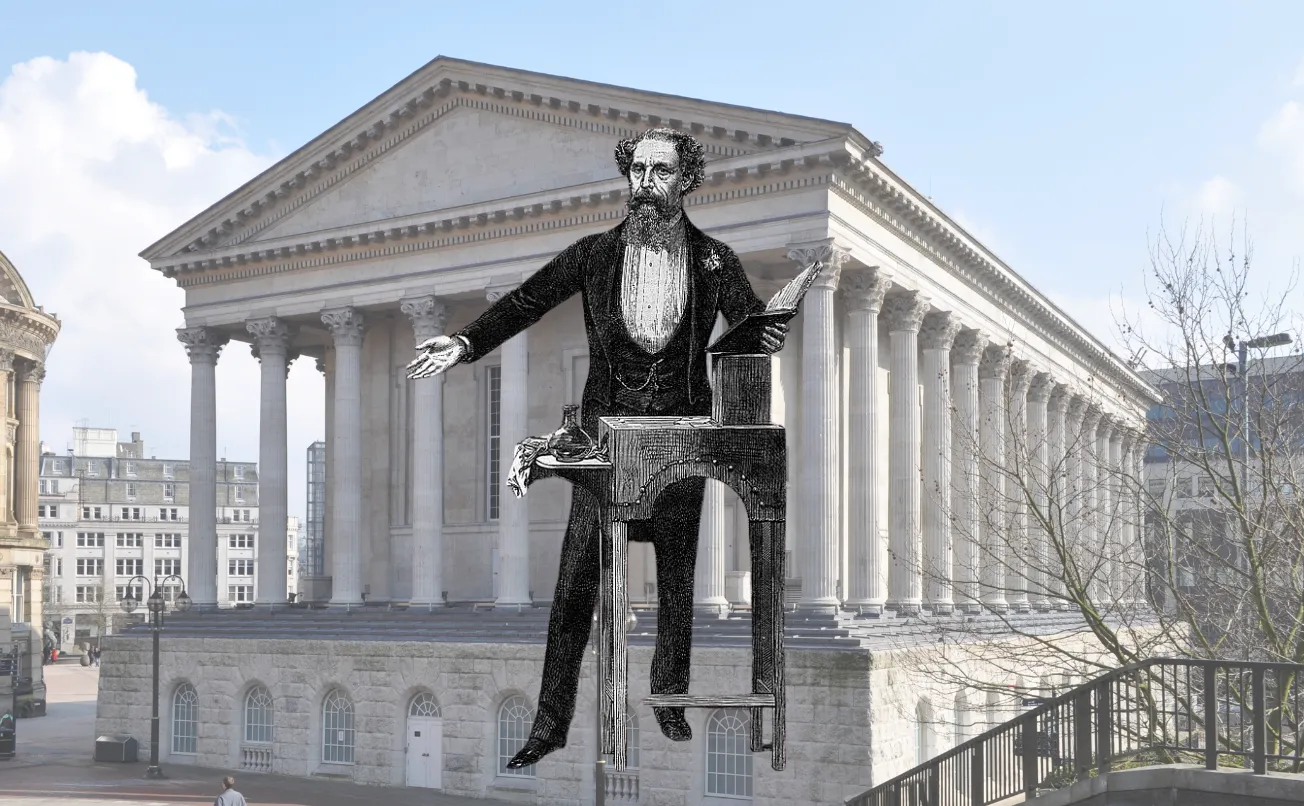Dear Patchers — Did you ever rave at the Que Club? Or attend a service at the Methodist Central Hall when it was still a church? For many Brummies, the building holds a special place in the city’s skyline, even if our only experience of it is admiring its terracotta grandeur as we walk by. If only the Hall could be brought back to life. That’s exactly what was supposed to happen when a developer got permission to turn it into a hotel two years ago — now, it’s stalled indefinitely. That’s the topic of today’s Big Story.
Catch-up:
- Jack’s weekend read took us inside a Black Country gurdwara, raising concerns over a trustee with terror convictions in India. But is he the victim of a terrible miscarriage of justice?
- Meanwhile, Kate looked into the long history (and possible future) of the Bull Ring: asking if it will still be here in 20 years. The story got people talking and sparked a debate in The Dispatch comment section — become a member to join the conversation.
Coming up:

- This Thursday will mark 50 years since the Birmingham Pub Bombings, in which 21 people lost their lives. We’ve been speaking to figures from across the city, asking why there hasn’t been an inquiry and if granting one will finally bring the families of the victims closure. (A reminder that a one-minute silence will be held in remembrance of the victims on Thursday at 2 pm).
- With the German Market up and running (controversial, as you’ll find out below in the briefing) it seems like Christmas has already arrived in Birmingham! This year’s major festive play, Mark Gatiss’s adaptation of A Christmas Carol, is on now at The Rep. Our Saturday story will review the production and explore the connection between the city and Dickens’ most famous work.
Editor’s note: If, like the Stirchley residents fighting against the opening of a McDonald's (read on for that one), you prefer the local things in life, perhaps that extends to your taste in journalism. The Dispatch publishes articles about events in Birmingham from political long reads to cultural curiosities with great storytelling at the forefront — and it is all funded by our readers. Be a part of our story by signing up today.
Discover England’s buzzing whisky scene

From today’s sponsor: No weekend plans? No worries. The English Whisky Festival is coming to The Bond in Digbeth on Saturday, 23rd November, your chance to buy a couple of warming bottles as the nights draw in. English whisky is very much on the rise, led by some excellent West Midlands distilleries, and at the festival, you can sample dozens of varieties. There are also masterclasses, a food court and an on-site bottle shop.
Dispatch readers can save £6 on the ticket price by using the code DI6PATCH. Find out more and book your ticket here.
Weather
⛄ Tuesday: We hit the minuses — expect our first snow of the season. Max 4°C.
❄️ Wednesday: Clear but cold. Max 4°C.
⛅ Thursday: Cloudy and sunny: on and off. Max 4°C.
🌥️Friday: Much the same. Max 5°C.
☔ Weekend: Rainy and dull — break out the jigsaw. Max 8°C.
We get our weather from the Met Office.
Big story: ‘Stop the rot’ — Que Club building’s future hangs in the balance
Top line: When developer Oakmount announced plans to turn the Methodist Central Hall on Corporation Street into a hotel in 2022, it looked as though one of Birmingham’s most iconic old buildings had been saved. It certainly needed saving; after living past lives as a church and a music venue (once hosting David Bowie) the storied Victorian building was down on its luck. But two years on those plans have now stalled.
Context: Birmingham City Council granted planning permission to Oakmount in 2022 to turn the grade II* listed church into a 155-bedroom hotel hotel with eight new bars and restaurants, a gym and events space. The plans were a joint venture between Oakmount and its sister companies, Press Up Hospitality and The Dean hotel brand — all three of which were founded by Paddy McKillen Jr and his friend Matt Ryan.

From praying to raving: The facelift would have been a major step to restore the church which was built in 1904 but has sat empty since 2017. Run by the Methodist Church until 1991, the red brick and terracotta building had a second lease of life as a live music venue and nightclub, playing host to the likes of David Bowie and Wu-Tang Clan at the legendary Que Club. Clearly though, it suffered from a few too many late nights — Historic England says the building is in poor condition and is on its at Risk Register.
Back to those Irish businesses: All three were set up in Dublin in the 2010s by the son of Irish property tycoon Paddy McKillen Sr and Ryan. Until recently, the ventures were a roaring success that underwent rapid expansion. But that growth has faltered, with the pair citing Covid, energy price rises, the Russia-Ukraine conflict and inflation hikes as major financial pressures. Still, that didn’t stop them from acquiring five new sites after the pandemic, including the €6.5m Butler Arms hotel in County Kerry.
Sell, sell, sell: In February, the pair sold off The Dean Hotel Group to London-based Lifestyle Hospitality Capital. In September, Press Up was taken over by London asset manager Cheyne Capital, who were owed around €45m by the company. Oakmount has been selling off its assets. Now, the Methodist Central Hall has gone into receivership which is a way of creditors trying to recover their money while avoiding the business going bankrupt. Contrary to social media posts, the Hall has not been taken over by Cheyne Capital — The Dispatch understands they have nothing to do with the development.
A foggy future: None of that makes it clear what will happen to the Hall and when. If it is sold off with the current plans, it could still become a hotel — but some Brummies are concerned that more urgent action is needed to maintain the building. The X account behind the Save Station Street campaign that was launched following the sudden closure of the Electric Cinema, posted that the building was “of huge historic importance to Birmingham” and that the council and West Midlands Combined Authority (WMCA) must “act now to stop the rot”.
Zoom out: A poster on the SkyScraperCity forum referred to the building as a key part of Joseph Chamberlain’s vision for Corporation Street as a “boulevard of grand buildings” and that “losing such a large, prominent and architecturally significant building would surely be unacceptable.” This is a recurring theme in Brum planning — whether it’s this building, Station Street or the Ringway Centre, we don’t seem to be very good at maintaining our old buildings and making them work for the present day.
Bottom line: Whether the building is sold off or not, it needs major regeneration to avoid it from becoming dilapidated. The longer it sits empty, the less likely it will be saved meaning Birmingham could lose one of its most historically important buildings.
Photo of the week

Birmingham 1962, by Peter Donnelly. Shared on Instagram by @aflashbak. (The wrong decade), still, it puts The Dispatch in mind of an off-cut from the original Tinker, Tailor, Solider, Spy series: all fog, cobblestones, and Cold War tension.
Brum in brief
📈 On the grapevine: The Dispatch understands that a key £5 million fund, whose main recipient is the West Midlands Growth Company, might be cut. Deep in the bowels of Labour’s 2024 autumn budget, it was revealed that “the government is minded to cancel…the West Midlands culture and inward investment funding, that was announced at Spring Budget 2024.” We then reached out to well-placed sources who were certain the Growth Company was likely to go. The company isn’t without critics, but its supporters say its existence has coincided with Birmingham achieving the second-highest level of FDI (foreign direct investment) in the country after London: with a 139% increase between 2022-2023. However, the Growth Company, despite high FDI levels, has not translated investment into GDP growth: and is now slated for major restructuring. Is Birmingham’s West Midlands Growth Company good value for money? How will its funding be affected by last month’s autumn budget? Do you have strong opinions on FDI? Give our staff writer a ping at sam@birminghamdispatch.co.uk.
🧑🎄 Here in Birmingham we like to keep ahead of the pack (rumour has it we were the first city to build integrated garages into houses) but are we taking it a bit too far with our Christmas markets? This year the city’s market has become the site of some controversy after it opened on November 1st: with a tail of construction leading back into late October — lapping both Halloween and Bonfire Night. “It’s too commercial. It starts too early, and it’s got too expensive,” Kate Jones tells The Guardian in Birmingham. Others complain about the sprawling nature of the markets taking up much-needed public space and creating inaccessible areas for disabled people. However, Birmingham City Council don’t want to hear your bah humbugs: “The Frankfurt Christmas market brings millions of visitors into the city each year, providing a huge economic boost and we are proud that the market also provides jobs for over 350 local people,” they told The Guardian.
🍔 In a strange echo of last summer’s anti-Gail’s Bakery protests in the trendy London suburb of Walthamstow, Stirchley residents are ‘reaching for their pitchforks’ to protest a different opening: a McDonald’s. Over 1000 people in the area have signed a petition against the development, citing it as a threat against the boutique and independent nature of the neighbourhood. McDonald’s claims the spot will create over 100 jobs for residents. Cassandra Kirk-Gould, who started the petition, argues that: “together, we can preserve Stirchley's independent weirdness [and] protect the interests of our community.” Meanwhile, one petitioner, named Fiona, simply wrote: “McDonald’s can do one.”
🛑 Protestors stopped traffic along the Bristol Road for the best part of two hours on Sunday calling for an end to the war on Palestine by Israel. Led by West Midlands healthcare professionals, the demonstrators marched from Selly Oak into the city centre, responding to calls from colleagues in the Middle East to protest the bombardment of healthcare facilities, aid and civilians by Israeli forces. “We are witnessing an organised, man-made famine with the blockade preventing the entry of humanitarian aid into Gaza,” said one hospital worker in a speech.
🚲 Birmingham City Council has insisted its move to propose limiting cycling in the city centre is not a ‘ban.’ Instead, their slated PSPO (Public Space Protection Order) would only limit cycling in certain areas of the centre and would specifically target fast-moving delivery drivers on e-bikes. What had previously been publicised as a ‘blanket’ cycling ban in yet unnamed areas of the city centre, is now being described as a carefully targeted policy which will be tailored around time periods and maximum speeds. Birmingham was named the UK’s most dangerous city to cycle in 2022 and last summer a ‘road safety emergency’ was declared by the council.
Home of the week

This Edgbaston house, resembling a Brummie set for a rendition of Who’s Afraid of Virginia Woolf, would be perfect for hosting existential 1960s-themed cocktail parties. John Madin designed it, and many other modernist icons in Birmingham that have been demolished, including the old Birmingham Central Library and BBC Pebble Mill complex. This property, part of a row Madin designed on Estria Road, contains alternating square parquet flooring, a generous courtyard garden and a balcony. It’s on the market for £445,000.
Media picks
📰 Dispatch fave Dan Cave has a new feature out in UnHerd, arguing that Birmingham needs to re-engineer its civic pride by looking back to both its Victorian patrons and mid-20th-century planners. What the 1860s shared with the 1960s, according to Cave, was that Birmingham’s elites were incredibly public-spirited, bequeathing fortunes to civic foundations and erecting grand shared spaces. Both the Victorian patricians and the trendy town planners of the 1960s saw decline all around them and wanted something better. As Cave says, “It’s easy to see how [we] could foster a retreat from civic ambition. We Brummies risk retreating even further into our Midlands home, lost in a pointless fight with Manchester over London’s attention.” Yet, the legacies of both the Victorians and the 1960s modernists in Birmingham are much debated. See both the 20th Century Society and the Victorian Society, founded by the journalist Simon Jenkins and poet John Betjeman respectively — both of which advocate for the conservation of derelict landmarks in the city including Smallbrook Queensway and the Methodist Central Hall.
📰 The i newspaper explores the Unite union and a missing £14 million ‘spent’ on the construction of a Birmingham hotel. The story involves senior Unite officials Len Mccluskey, Sharon Graham and Howard Beckett. The Dispatch covered the Unite linked hotel developments back in October revealing that Beckett, who had oversight of the hotel project, was under investigation by South Wales Police on suspicion of bribery, fraud and money laundering and that he is suspected by Unite of misleading its governing body about the cost and valuation of the hotel.
🎧 Listen to a new podcast, launched by Birmingham City University, detailing feminist activism in Birmingham during the 1980s. Put together by academic Dr Siobhán Stevenson, the series explores the role Birmingham’s ‘women’s lib’ movement played through Birmingham City Council’s ‘Women’s Committee’ and ‘Women’s Unit.’ The units, set up in 1984, were tasked with putting on city-wide events for West Midlands women: these included a week-long festival, a directory of women’s services and a campaign highlighting low pay. Yet Birmingham feminists involved with the units also branched out: campaigning for nuclear disarmament and on behalf of the miners’ strike.
Things to do
Tuesday
🎤 Go see brother-sister duo Wasia Project at the O2 Academy on Tuesday. The Wasia Project are touring their latest EP Isotope, an extended play of classical, disco and jazz influences. Doors at 7 pm.
🎭 If you’d prefer a dose of Shakespeare over Dickens, King Lear is on at the Crescent Theatre until the end of the month. The tragedy begins at 7.15 pm and tickets cost between £10 and £13.50.
Wednesday
🕺RBC Salsa Orchestra, now renamed the BCU Salsa Orchestra, will be playing Hockley Social Club this Wednesday. Expect syncopated beats from Cuba, Colombia, Puerto Rico and further afield. Doors at 5 pm. Tickets from £5.
🎙️ Catch the singer-songwriter — with perhaps the best stage name ever — Pokey LaFarge’s all-American blend of swing, jazz and blues at the Castle and Falcon from 6.30 pm until late. Tickets are £33.25.
Thursday
🦋 Go see the classic anime Paprika (2006) at the Mockingbird Cinema this Thursday. Paprika, by Satoshi Kon, is an action-packed sci-fi adventure exploring the concept of ‘dream terrorism.’ As you might have guessed, the film strongly influenced Christopher Nolan’s Inception (2010). Back in 2008, The Guardian called the flick: “psychedelic eye candy.” Sounds good to us…Starts at 8 pm. Tickets from £4.99.
🪩 “Oh baby,” UK disco pioneers, The Real Thing, are playing The Jam House in St Pauls Square on Thursday. Original band members Chris Amoo and Dave Smith will be performing lead vocals together alongside a backing band. Doors at 6 pm. Tickets start from £18. Dress code: smart casual.
Thanks to the English Whisky Festival for sponsoring this edition — find out more here. If you'd like to reach over 20,000 Patchers — and support The Dispatch with your marketing budget — please contact daniel@millmediaco.uk








Comments